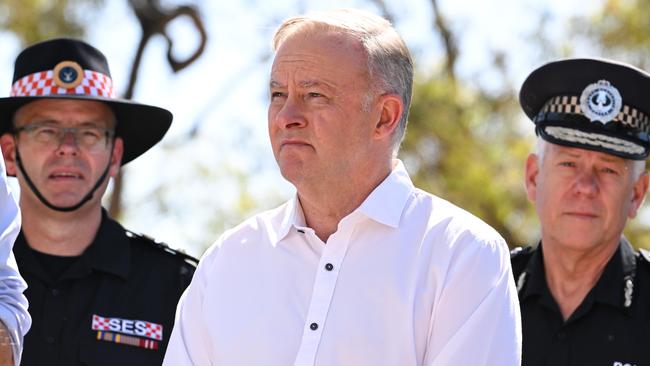
The partial data before the release of the September quarter national accounts suggest the economy is in a tricky transition.
Some companies and workers are doing well as Covid-19 restrictions become a relic, tourists and students return, and the jobless rate hovers at a five-decade low.
But inflation is pushing up the price of many inputs for businesses, including energy, wages and interest costs, and profits are taking a hit.
In the first three months of the financial year, company gross operating profits fell by 12.4 per cent, while the total bill for wages and salaries rose by 2.9 per cent.
It’s not just a mining reality check and an easing in the prices for some commodities. Returns were down for the finance industry and manufacturers.
Pay rose by 8 per cent in the hospitality sector helped by the boisterous recovery in the industry and increases of up to 5.2 per cent in the minimum wage, which you’ll recall the Prime Minister keenly argued for, using a $1 prop at every media staging post.
Over the year, average wages per worker are up 4.7 per cent. Still, consumer inflation is running at 7.3 per cent, and rising, so purchasing power has deteriorated.
With the Reserve Bank expected to raise its cash rate target for the eighth month in a row on Tuesday, household finances will again be squeezed in the new year.
The central bank is on a narrow path to bring inflation back to target without pushing the economy into recession.

The Prime Minister has another, no less difficult, balancing act: to ensure the settings are right for companies to keep investing, hiring workers and innovating to get a sustainable lift in national living standards.
When he became Labor leader, Albanese said he wanted to ditch the unpopular Bill Shorten’s class-war rhetoric.
“We need to explain our position much better on how we will create wealth, not just how we will share wealth,” he vowed just after the May 2019 election.
“Unless we are growing the pie then sharing it becomes a case of diminishing returns.”
Over the past three years, albeit helped by the Morrison government’s big-spending response to the pandemic, Labor’s “small-target” approach and junking of Shorten’s tax proposals narrowed the differences with the Coalition on economic policy.
According to the Australian Election Study, the Coalition’s advantages over Labor on management of the economy and taxation are much reduced since 2019.
One quarter of voters see no difference between the major parties on the economy; one third said the same on taxation.
But when it came to dealing with the election’s top issue, cost of living, Labor was streets ahead of its main rival.
The business lobby feels it’s been stiffed by the Albanese government after the passage in parliament of the Secure Jobs, Better Pay legislation and the humiliations of the jobs and skills summit.
Labor is seeking a win-win era of accord and shared prosperity.
It demands healthy companies, taking risks and being fleet, not hurting capital with red tape, extra costs and political payback.






How long will it take before Anthony Albanese declares we need to “get profits moving again”?